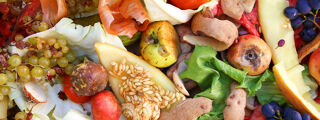Developing and testing systems which break down food waste in preparation for conversion into sustainable biogas. The technology developed increases the biogas yield of food waste and has been utilised by industry partners to improve their output.
Researchers
Research background
According to the Food and Agriculture Organisation of the United Nations (FAO, 2019), almost 1.3billion tonnes of food is lost or wasted globally each year. This organic material arises at various points along the whole food supply chain from farm to consumer. In many countries dumping of this waste material to land can have significant impacts on the environment as well as human health. One solution is to capture this waste and convert it into sustainable bioenergy using Anaerobic Digestion (AD).
Lignin and cellulose (a common component of food waste) are also challenging compounds to breakdown during anaerobic digestion. Research conducted by BBRG has led to the design of a novel, 2 stage digestion technology which improves the biodegradation of food waste leading to increased solubilisation of material and enhanced biogas production. The system utilises and innovative up-flow, suspended bed design (which improves mass transfer within the reactor) and can be constructed with basic materials for retrofit on to existing and low performing AD plants. The research was conducted in collaboration with Kingdom Bioenergy Ltd an AD design and consultancy SME based in the UK. The findings from the research were used to inform the design and operation of a retrofit plant in South India.
Research aims
To design and test a novel upflow suspended bed reactor to pre-digest material prior to Anaerobic Digestion. The project evaluated several design prototypes and operational protocols and the impact of these on organic breakdown and biogas production. The aim of the project was to provide a design specification and standard operating procedure for a full-scale system.
Research methods
This project involved the design and testing of a novel, lab-scale, Upflow Leach Bed Reactor (ULBR) for the treatment of food wastes. Following the design and testing of various prototypes an optimised system was developed. This system was operated in isolation (recirculation mode) and then with semi-continuous feeding to a CSTR. Samples were taken regularly to assess organic degradation using pH, Alkalinity, COD and VFA production as indicators.
Research outcomes
The efficacy of this design was demonstrated via the destruction of volatile organic solids in the waste (measured as soluble chemical oxygen demand) this was found to increase significantly over the period of the trials. The design is simple and low cost and can be easily retrofit to existing AD plants to improve the efficacy of treatment and improve biogas production.
The results of the work have enabled our industry partner (KBE Ltd.) to develop and implement commercially viable systems that are sustainable and cost competitive.
